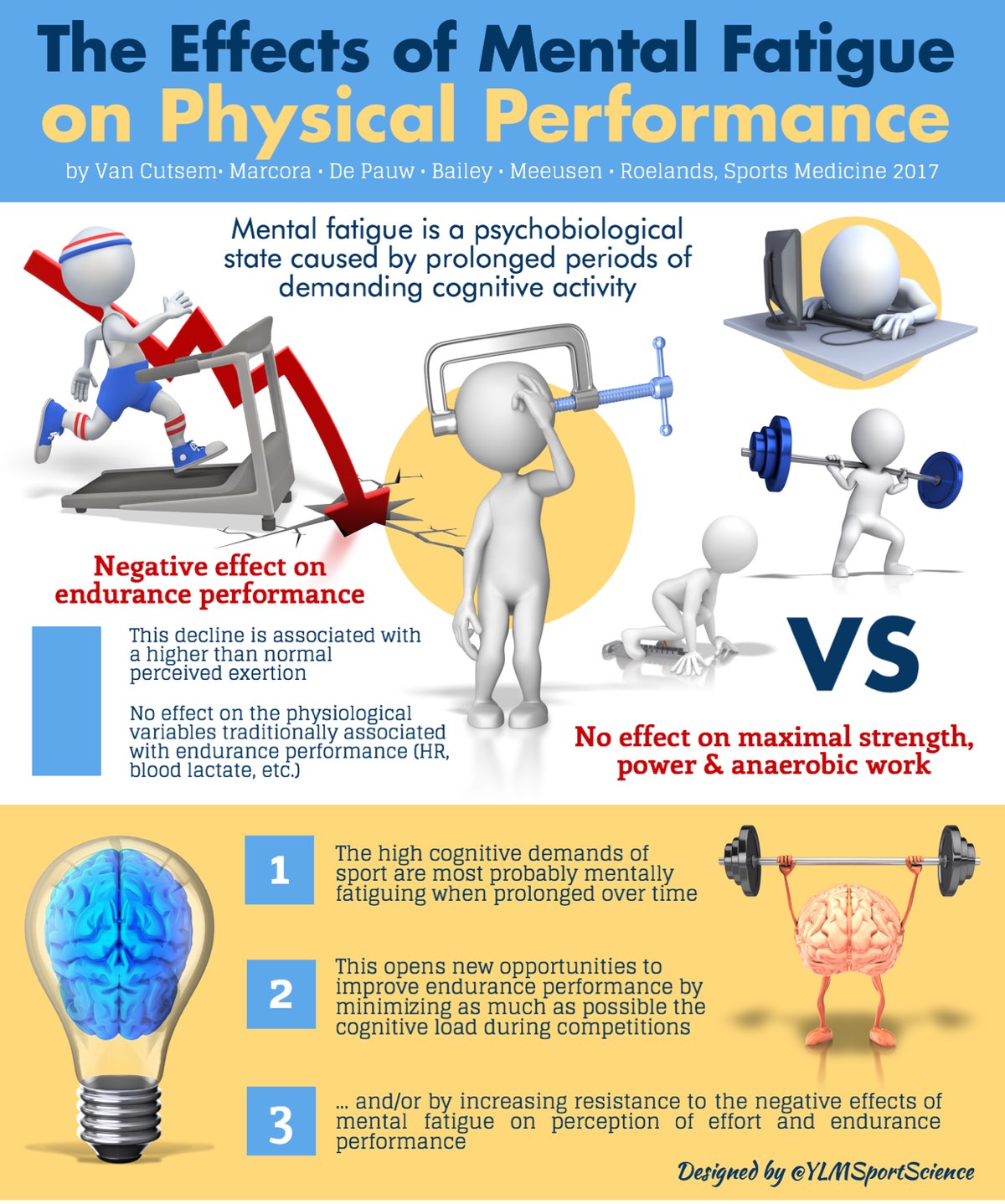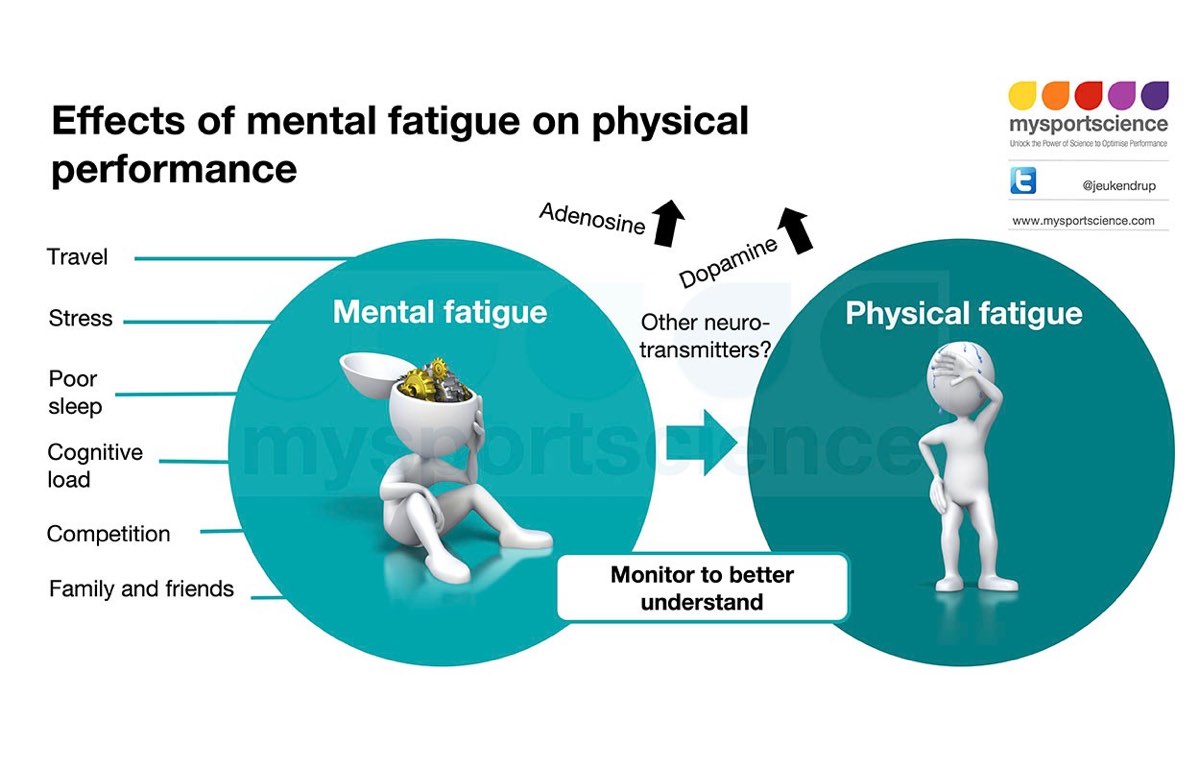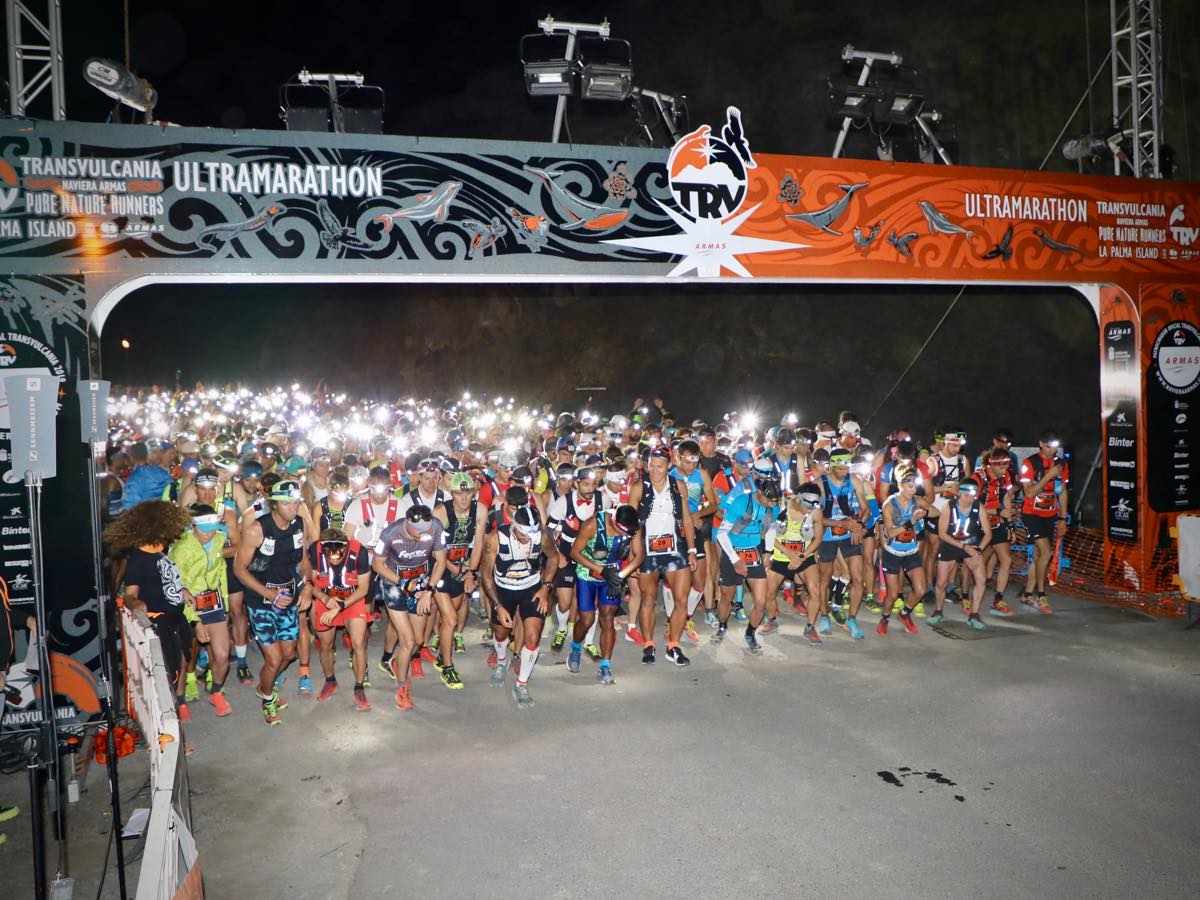Tired, pooped, or can’t think clearly? We’ve all experienced fatigue! Perhaps you were in the middle of a huge training block, you had work deadlines piled up, or you welcomed a new addition to your family. Heck, even surviving a global pandemic is all consuming.
As it turns out, fatigue comes in two forms: physical fatigue and mental fatigue. What’s the difference between the two? And how does mental fatigue impact endurance performance? In this article, we dive into what we know about mental fatigue and managing its major catalysts as they pertain to endurance running.
A Little More Than Psychology 101: What Is Mental Fatigue?
We’re all familiar with the term “fatigue” in the context of exercise, particularly muscular fatigue. You can conjure what it feels like as your legs grow heavy and your ability to generate forward momentum diminishes.
For a long time, fatigue impacting athletic performance was thought to be solely a physical phenomenon. Over the last decade, this theory has been tested with research (4, 5). Led by Dr. Samuele Marcora, science has shown how the brain is responsible for some of our experiences with fatigue as it collects those physical sensations and decides how much is too much (1, 3). This is what we now call mental fatigue.
Mental fatigue is a psychobiological state, an interaction between biology and behavior, caused by long periods of demanding cognitive and/or physical activities. Examples include studying for an exam, a rigorous workday, a multi-week period of non-functional overreaching in training, or in the case of many research projects 30 to 90 minutes of computer tasks (1). Mental fatigue of this nature can manifest subjectively (lack of energy, decreased motivation, and decreased alertness), behaviorally (decline in both physical performance and cognitive tasks, decreased accuracy, and decreased reaction times), and physiologically (alterations in brain activity) (1).
Even though you might not be running harder, your perceived level of exertion is higher when you have high levels of mental fatigue. This in turn often causes a decrease in performance, which in the research laboratory means a decrease in time to exhaustion and on the run equates to slowing down because the effort feels harder than normal. Remarkably, this slowing down does not come with changes in physiological markers such as heart rate, VO2max, or blood-lactate levels. This again points to a cause of fatigue that goes beyond solely physiological means (1).
The exact mechanism for the increased perceived exertion is not completely understood, but it’s possibly a result of the accumulation of adenosine (a naturally forming compound whose role is to suppress the central nervous system and prompt sleep) and a decrease in dopamine (a feel-good neurotransmitter) in your brain (8).

Mental fatigue causes a decrease in endurance performance due to higher than normal perceived exertion. Image: Ylmsportscience.com/2017/01/10/the-effects-of-mental-fatigue-on-physical-performance/
But I Get Adequate Rest: Mental Fatigue Comes From Many Places
We know that improvements in our running come through combining adequate stress and adequate rest. If you’ve recovered physically, then why do you still feel so terrible?
Just as we’ve discussed with non-functional overreach and overtraining syndrome, outside stressors really strain our physical and psychological wells. This includes work, family, social media, injury concerns, travel, not meeting your sleep needs, a multi-week bout of hard training, schoolwork, exams, and video games (7).
This might seem like common sense, and I joke that there is plenty of “well, duh” research out there. But in a world looking for shortcuts, sometimes the obvious answers are the most important. Ultrarunning takes endurance activity to the extreme, so we can imagine how vital mental freshness is for performance. Anecdotally, I’ve heard more than one athlete attribute their ultramarathon success not to them being in peak physical shape but instead to being mentally fresh so that they have a psychological reserve for when it gets tough. And believe you me, from a gal who really likes hard science, it took me time to understand the underpinnings of that strategy.

Many different aspects of day-to-day life, travel to competition, and taper activities can increase mental fatigue leading up to an event. The accompanying uptick in perceived exertion can be linked to the accumulation of adenosine and a decrease in dopamine concentrations in the brain. Image: Mysportscience.com/post/2020/01/12/mental-fatigue-in-sport-what-is-it-and-how-do-we-recover-from-it
Flex Your Brain: More on Mental Fatigue and Why Athletes Have a Leg up
Okay, now we understand that components of being an athlete can increase your mental fatigue. But does being an endurance athlete give you skills to combat mental fatigue? The answer appears to be, in part, yes!
Numerous studies have subjected athletes to a cognitively challenging task like a computer game before getting on a bike or a treadmill to go as hard as they can for as long as they can. When the cognitive task was only 30 minutes long, highly trained endurance athletes were much less affected by mental fatigue than their recreational peers (11). Essentially, the athletes had built up a greater resistance to the negative effects of mental fatigue, and while genetics cannot be ruled out, this is likely a positive side effect of training. However, when trained endurance athletes underwent 90 minutes of cognitively demanding work before an exhaustive exercise test, they ended the tests sooner with higher rates of perceived exertion (3). Like many things, the dose needed to prompt mental fatigue to a degree that impairs endurance performance is likely highly individual, but what this suggests is that the training done by endurance athletes adds some protection.
We keep saying that endurance performance is impaired, as opposed to all sports performance. Right now, the literature strongly suggests that power sports and activities performed at maximal effort (thus likely anaerobic) are not impacted by mental fatigue in noticeable amounts (5, 15).
Additionally, and maybe tangentially, we know that mental fatigue acts not dissimilarly to excessive sport training (specifically non-functional overreach) when it comes to cognitive function. Both excessive training and excessive cognitive work affect the brain’s lateral prefrontal region (16). This portion of your brain is vital for decision-making, and when you increase training and cognitive work, you can reduce activity there. This translates to fatigued athletes, down a decision-maker, experiencing subjectively lower levels of motivation.
Although there is still much to learn, particularly on how cognition is affected by longer ultramarathons, it is interesting to speculate how this might impact events that require higher-level thinking, such as route finding and long-term nutrition and hydration monitoring, when you’re neither mentally nor physically fresh!
Tips for Preventing Mental Fatigue in Endurance Performance
What can you do to put your best foot forward?
- Monitor your mood. Keeping a training log with objective and subjective feedback can highlight when you feel more or less mental strain. Whether it’s a busy season at work or how you respond to a long-haul flight, understanding which events drain your energy and then adjusting your training around them can prevent additional mental fatigue and unintentional overreaching.
- Consider activity timing. Since we recognize that many things produce cognitive strain and therefore mental fatigue, prioritizing your training around those more draining activities can go a long way. Practical examples are exercising before a long workday or utilizing particularly draining times to focus on power and speed development which aren’t impacted by mental fatigue.
- Taper your mind. Take inventory of your daily stressors and decrease them before competition. Maybe this means taking social-media breaks, having childcare assistance, or delegating tasks to family and friends in the days before your goal event.
- Utilize brain breaks. Research has shown that just a 20-minute unstructured break during a four-hour work or school session greatly increases productivity and energy and decreases feelings of mental fatigue (14). Applying this logic to ultramarathons, we wonder if allowing yourself to periodically “check out” and just run may help keep the energy scale balanced?
- Focus on sleep hygiene. We know how important sleep is for performance, injury prevention, and your general health including immune function. Sleep deprivation has similar effects on performance as mental fatigue, meaning a decrease in time to exhaustion with associated increases of perceived exertion (2, 5).
- Stay on top of nutrition and hydration. Your brain’s main fuel source is glucose, a simple sugar! However, neurons cannot store glucose and so your brain depends on the bloodstream to deliver a near-constant supply. Staying well fed generally and ingesting fuel regularly on the run keep your brain communicating with your body. Additionally, proper hydration means fluid balance within your body. If you become dehydrated, blood flow to your brain reduces, which can make you feel sleepy and exhausted.
- Take advantage of caffeine. Caffeine has long been considered an athletic performance aid. The main reason caffeine likely aids performance is that it can actually decrease feelings of fatigue, keeping you alert and focused. It does this primarily by blunting the effects of adenosine.
- Embrace your training. There is some evidence that more highly trained endurance athletes have some protection from mental fatigue built up, perhaps as an accidental byproduct of regular training (11). So keep showing up, because part of the reward might be “down the trail!”
Call for Comments
Share your experiences with and questions about mental fatigue and endurance running in the comments section.
References
- Cutsem, J. V., Marcora, S., Pauw, K. D., Bailey, S., Meeusen, R., & Roelands, B. (2017). The Effects of Mental Fatigue on Physical Performance: A Systematic Review.Sports Medicine, 47(8), 1569-1588. doi:10.1007/s40279-016-0672-0
- Cutsem, J. V., Pauw, K. D., Buyse, L., Marcora, S., Meeusen, R., & Roelands, B. (2017). Effects of Mental Fatigue on Endurance Performance in the Heat.Medicine & Science in Sports & Exercise, 49(8), 1677-1687. doi:10.1249/mss.0000000000001263
- Marcora, S. M., Staiano, W., & Manning, V. (2009). Mental fatigue impairs physical performance in humans.Journal of Applied Physiology, 106(3), 857-864. doi:10.1152/japplphysiol.91324.2008
- Staiano, W., Bosio, A., Morree, H. M., Rampinini, E., & Marcora, S. (2018). The cardinal exercise stopper: Muscle fatigue, muscle pain or perception of effort?Progress in Brain Research Sport and the Brain: The Science of Preparing, Enduring and Winning, Part C, 175-200. doi:10.1016/bs.pbr.2018.09.012
- Marcora, S. M., & Staiano, W. (2010). The limit to exercise tolerance in humans: Mind over muscle?European Journal of Applied Physiology, 109(4), 763-770. doi:10.1007/s00421-010-1418-6
- Mccormick, A., Meijen, C., & Marcora, S. (2015). Psychological Determinants of Whole-Body Endurance Performance.Sports Medicine, 45(7), 997-1015. doi:10.1007/s40279-015-0319-6
- Desmond P and Hancock P. Active and passive fatigue states. In: Stress, workload, and fatigue edited by Hancock P. Mahwah, NJ, US: Lawrence Erlbaum Associates Publishers, 2001, p. 455-465.
- Martin K, Meeusen R, Thompson KG, Keegan R, and Rattray B. Mental fatigue impairs endurance performance: A physiological explanation. Sports medicine (Auckland, NZ): 1-11, 2018.
- Meeusen R and Roelands B. Fatigue: Is it all neurochemistry? European Journal of Sport Science: 1-10, 2017.
- Russell S, Jenkins D, Smith M, Halson S, and Kelly V. The application of mental fatigue research to elite team sport performance: New perspectives. J Sci Med Sport 22: 723-728, 2019.
- Martin K, Staiano W, Menaspa P, Hennessey T, Marcora S, Keegan R, Thompson KG, Martin D, Halson S, and Rattray B. Superior Inhibitory Control and Resistance to Mental Fatigue in Professional Road Cyclists. PloS one 11: e0159907, 2016.
- Pageaux, B., & Lepers, R. (2018). The effects of mental fatigue on sport-related performance.Progress in Brain Research Sport and the Brain: The Science of Preparing, Enduring and Winning, Part C,291-315. doi:10.1016/bs.pbr.2018.10.004
- Russell, S., Jenkins, D., Rynne, S., Halson, S. L., & Kelly, V. (2019). What is mental fatigue in elite sport? Perceptions from athletes and staff.European Journal of Sport Science,19(10), 1367-1376. doi:10.1080/17461391.2019.1618397
- Blasche, G., Szabo, B., Wagner‐Menghin, M., Ekmekcioglu, C., & Gollner, E. (2018). Comparison of rest‐break interventions during a mentally demanding task.Stress and Health,34(5), 629-638. doi:10.1002/smi.2830
- Martin, K., Thompson, K.G., Keegan, R. et al.Mental fatigue does not affect maximal anaerobic exercise performance. Eur J Appl Physiol115, 715–725 (2015). https://doi.org/10.1007/s00421-014-3052-1
- Jäncke, L. (2019). Faculty Opinions recommendation of Neuro-computational Impact of Physical Training Overload on Economic Decision-Making.Faculty Opinions – Post-Publication Peer Review of the Biomedical Literature. doi:10.3410/f.736669796.793565668

